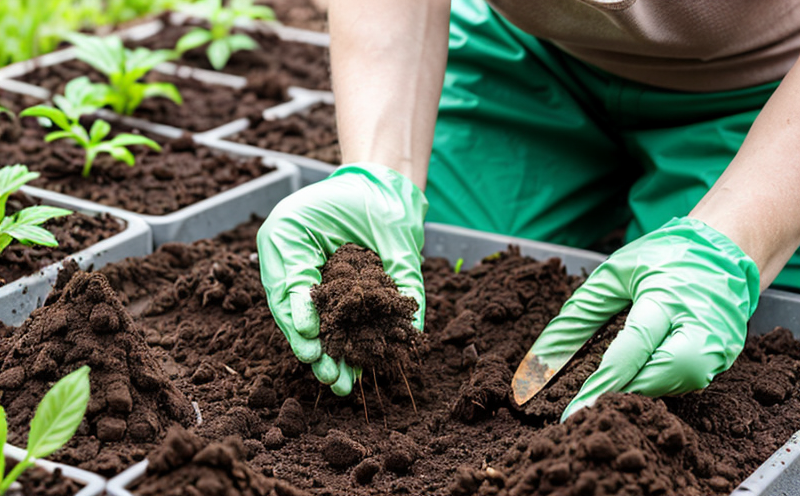DIN EN ISO 11357 DSC Thermal Analysis of Gardening Plastics
The DIN EN ISO 11357 standard specifies the procedure for differential scanning calorimetry (DSC) thermal analysis, which is used to determine the phase transition temperatures such as melting points and crystallization points in polymers. This method is particularly useful in the context of gardening plastics where understanding the thermal properties is crucial for product performance and durability.
Thermal analysis plays a pivotal role in ensuring that materials meet specific quality standards, especially when dealing with outdoor conditions. The garden industry relies on durable and weather-resistant materials which must withstand varying temperatures without degrading. By using DIN EN ISO 11357 DSC thermal analysis, manufacturers can ensure their products perform optimally under these challenging conditions.
The test involves heating a sample of plastic at a constant rate while monitoring the heat flow between the sample and an empty reference material. The temperature difference is recorded as the sample undergoes phase transitions like melting or crystallization. This provides insight into the thermal stability, which is essential for predicting how these plastics will behave in real-world applications.
For gardening plastics, this analysis helps identify suitable materials that can withstand prolonged exposure to sunlight and varying temperatures. It also aids in optimizing production processes by ensuring that the chosen polymers meet all necessary criteria before being used commercially.
The scope of DIN EN ISO 11357 covers various types of polymeric materials commonly found in gardening applications, such as polyethylene (PE), polypropylene (PP), and polystyrene (PS). Each type has unique thermal properties that are critical for its intended use. Understanding these characteristics through DSC analysis ensures compliance with industry standards while enhancing product quality.
The standard specifies precise procedures to prepare samples correctly before conducting the test. Proper sample preparation is crucial because any impurities or irregularities could lead to inaccurate results, affecting both the accuracy and reliability of findings. Additionally, it emphasizes the importance of using appropriate calibration techniques to obtain accurate measurements.
Instrumentation plays a vital role in achieving consistent results from DSC tests conducted according to DIN EN ISO 11357. Modern DSC instruments are designed with high precision sensors capable of detecting minute changes in heat flow accurately. These devices typically feature software that allows users to control heating rates, set temperatures, and analyze data post-test.
Understanding the results generated by DIN EN ISO 11357 requires knowledge about interpreting the curves produced during testing. Typically, two main types of transitions are observed: endothermic (heat absorption) and exothermic (heat release). Endothermic peaks indicate melting points or glass transition temperatures depending on the material type, whereas exothermic events correspond to crystallization processes.
Compliance with DIN EN ISO 11357 ensures that manufacturers produce reliable gardening plastics that meet stringent quality requirements. This standard helps maintain consistent product quality across different batches by providing clear guidelines for testing procedures and acceptable ranges of values.
In summary, DIN EN ISO 11357 DSC thermal analysis is an essential tool in the development and manufacturing processes of gardening plastics. It enables manufacturers to select appropriate materials based on their thermal properties, optimize production methods, ensure compliance with international standards, and ultimately deliver high-quality products that perform well under outdoor conditions.
Industry Applications
- Garden furniture made from polyethylene (PE) or polypropylene (PP)
- Bright-colored plastic pots for seedlings
- Watering cans and hoses using polystyrene (PS)
- Recycling bins designed to withstand outdoor elements
| Type of Plastic | Main Application | Thermal Property Key |
|---|---|---|
| Polyethylene (PE) | Garden furniture, piping systems | Melting point: ~130°C |
| Polypropylene (PP) | Plastic pots, containers | Melting point: ~165°C |
| Polystyrene (PS) | Bright-colored plastic items, insulation | Crosslinking temperature: ~240°C |
The DIN EN ISO 11357 standard is widely used across the gardening and outdoor plastics sector to ensure that materials are suitable for prolonged exposure to the elements. By applying this method, companies can enhance product durability, extend shelf life, and meet strict regulatory requirements.
Quality and Reliability Assurance
The application of DIN EN ISO 11357 DSC thermal analysis in gardening plastics ensures that manufacturers adhere to stringent quality control measures. This standard provides a structured approach for testing materials, allowing companies to identify potential issues early on in the development process.
By incorporating DIN EN ISO 11357 into their workflows, organizations demonstrate commitment to excellence and reliability. The detailed procedure outlined within this standard ensures consistent results across multiple batches of plastic products, enhancing trust among customers who rely on these materials for outdoor applications.
The use of DSC thermal analysis also facilitates continuous improvement by providing valuable insights into material performance under different environmental conditions. With accurate data at hand, manufacturers can refine their formulations to better suit specific needs, leading to more robust and long-lasting products.
In addition to enhancing product quality, compliance with DIN EN ISO 11357 supports regulatory requirements set forth by various governing bodies worldwide. By adhering strictly to these guidelines, companies ensure their gardening plastics meet international standards, thereby expanding market reach while maintaining high levels of customer satisfaction.
Overall, implementing DIN EN ISO 11357 DSC thermal analysis in the manufacturing process significantly contributes to producing reliable and durable gardening plastics that can withstand harsh outdoor environments. This commitment to quality not only benefits end-users but also fosters long-term relationships with satisfied customers.





